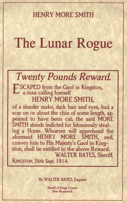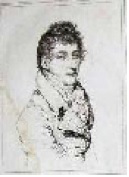When burglary was a capital offence
Kings County, 1837
Prior to the reform of the criminal law in the Britain's North American colonies in the 1830s and 1840s, burglary was a capital offence. Although burglary, robbery and capital larceny were rare offences, persons convicted of these crimes could be executed. Benefit of clergy, a type of literacy test, was one possible way to escape execution in capital cases, although prisoners might have to be branded with a hot iron.
Even in homicide cases, convicted prisoners had a good chance of having their sentences commuted to life in prison. Yet there were exceptions, such as the 1827 trial of Patrick Burgan, a young Irish Catholic. Burgan was charged with breaking in to the residence of his former employer in Saint John and stealing a watch and some money. He then broke into a nearby sailors’ boarding house and stole clothing. He was apprehended east of Saint John in King's county.
According to Victorian chronicler Kilby Reynolds, despite a popular memory that the ‘boy burglar’ had stolen only 25 cents from his employer’s till, Burgan had, by the standards of the day, committed two serious crimes. He was provided with defence counsel by the court. The trial took place in the old court house that was located at Market Square, near Saint John’s waterfront. A jury recommended mercy and a petition was circulated to save Burgan, who was 18 or 19 and had no known criminal record, from the gallows.
Governor Howard Douglas refused to intervene and in February of 1828 Burgan was hanged from the second story of the county jail, before a large crowd. The executioner had been a fellow convict who was pardoned and rewarded with 10 pounds for carrying out this unpopular duty. According to one report, Burgan had attempted to escape his cell by setting a fire.
In 1842, the New Brunswick legislature abolished the death penalty for burglary and highway robbery. Burgan's youth, religion (Catholic) and ethnicity (Irish) contributed to a local memory that he had been the victim of a miscarriage of justice (or what the Victorians called 'judicial murder').
This reform of the criminal law came too late for Burgan, and for the individual mentioned below. The following report appeared in the New Brunswick Courier, Feb. 4, 1837:
At the Kingston Circuit held last week before his Honor Judge Parker, a singular and very awful circumstance occurred, adding another melancholy instance of the fatal effects of Intemperate habits to the long catalogue already recorded. A criminal confined in a Kingston gaol, by the name of George WRIGHT, was indicted by the Grand Jury for Burglary, in breaking and entering the dwelling house of one SMITH, a Tavern Keeper of Hampton, by forcing up a window, at the hour of 11 at night, when the family had all retired to rest, breaking open the door of the Bar-room, and taking there from 'a bottle of Rum'. - There was very little doubt of his guilt, and as the offence is punishable with Death, it was expected that in a few days his earthly career would be terminated by the most ignominious punishment known in the land. It was stated that he was in the habit of pilfering whenever an opportunity presented itself, to gratify his passion for Ardent Spirits - His Trial was fixed for Wednesday morning at 10 o'clock, and two Gentlemen of the Bar, tending the Court on Civil business were assigned to be his Counsel. His appearance when called upon to plead to the Indictment was not less shocking than when those Gentlemen visited him in his dreary cell - it was scarcely human - his person deformed, emaciated and shaking as if with the severest attack of ague and covered with rags and dirt. The Gaoler had stated that he had burnt a pair of pantaloons and two beds which had been provided for his comfort by the humanity of the Sheriff. His story to his Counsel was broken and wandering and repetitious, and not so totally disconnected as to lead to a belief of his insanity, which seemed to be his object. He also appeared to have been taking some liquor. Upon the whole, they left him unable to come to any conclusions as to his state of mind, intending to make the best of his wretched case in the morning. When the morning came he was found lying dead in his solitary room, stretched out with his feet towards the stove, just where his keeper had left him the night before, an awful example of the long course of vice, proceeding evidently from an insatiable and inconquerable thirst for Ardent Spirits terminating in a dreadful and wholly unprepared death!
A felon who got away
 In 1837 the King’s County jail was still located in what was then the shiretown, Kingston. This was the scene of the reported escapades of the 'Lunar Rogue,' the mysterious prisoner Henry More Smith, detailed in an account written by Sheriff Walter Bates (1760-1842), an original Loyalist settler. More was arrested for horse stealing in 1814; after he escaped from the Kingston jail he committed the offence of burglary.
In 1837 the King’s County jail was still located in what was then the shiretown, Kingston. This was the scene of the reported escapades of the 'Lunar Rogue,' the mysterious prisoner Henry More Smith, detailed in an account written by Sheriff Walter Bates (1760-1842), an original Loyalist settler. More was arrested for horse stealing in 1814; after he escaped from the Kingston jail he committed the offence of burglary.
 The authorities were so impressed by his ingenuity that he was pardoned on condition that he depart from the colony of New Brunswick. Smith’s criminal career continued in New England and New York and the story of his adventures appeared in print several times throughout the 19th century.
The authorities were so impressed by his ingenuity that he was pardoned on condition that he depart from the colony of New Brunswick. Smith’s criminal career continued in New England and New York and the story of his adventures appeared in print several times throughout the 19th century.
Related: 1910 edition of this tale, printed in New Brunswick.
